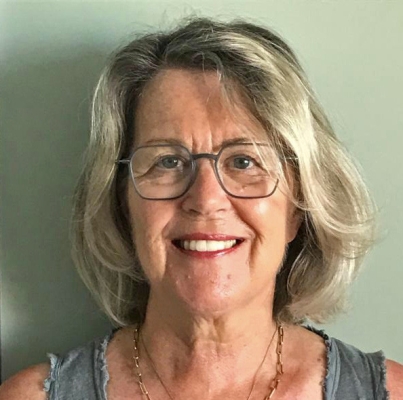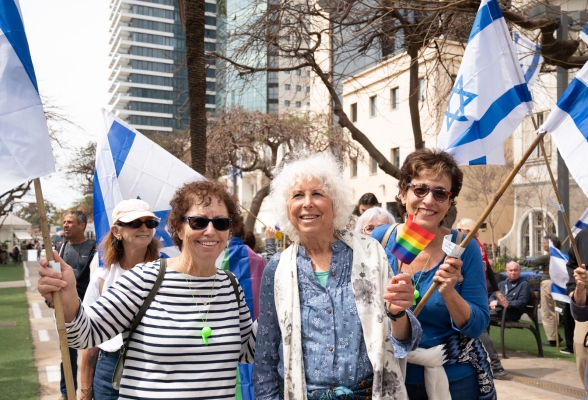Anne Berkley, A Grandmother With Guts
Photos from the Grandmothers for Democracy protests
It's not unusual for grandmothers of a certain age to gripe a little when they get together: sciatica playing up AGAIN, hips eroding – many happy hours can be spent in a pleasant communal moan. But today grannies, like so many others in our fractured land, don't obsess about osteoporosis; we're all too depressed about our disintegrating country. The symptoms are universal: sinking feelings in the stomach as we read the morning newsflashes on our phones, panic as we read the papers, torment when we watch TV. Is this a chronic illness in our beloved land, we wonder, or is it terminal? Is there any treatment, anything that we can do?
And, it seems, yes, we can.
About four weeks into the general protests in Israel, which gather hundreds of thousands of concerned citizens every week on the streets to demonstrate against the threat to democracy and our way of life, Anne Berkeley, a glamorous granny of 70, originally from Glasgow, was in her Netanya kitchen preparing for Shabbat. The challot were resting under their cover, the chicken was crisp, the salads cut and spiced. The sun was setting over the Mediterranean Sea.
But Berkeley's guts were churning. "I left Scotland with my husband in 1978," she explains. "We brought up four kids here and have seven Sabra grandchildren. We are a religious family and it was really living the dream to build our lives in a Jewish state." Berkeley's husband worked as a physician; she did international fundraising for research at Ben Gurion University in Beer Sheva. "But now I'm having sleepless nights. All anyone seems to be talking about is whether our grandchildren have a future here. I'm terribly concerned."
Berkeley, who'd demonstrated a bit as a young student against Apartheid but hadn't been active for decades, decided that grandmothers should form a group to fight for their families' futures. She opened a WhatsApp group, called some friends and by the time she lit her Shabbat candles there were 40 members signed up. Berkeley switched off her phone to observe the Sabbath, and when she reconnected 25 hours later there were over 1000 people on board.
Next was the question of what to do with them. Berkeley's first foray into activism was a march from Habima to Beit Dizengoff, a short stroll through shaded Rothschild Street which, with its plentiful benches, is eminently suitable for aging grandparents with wonky knees. She published through WhatsApp and social media, begged for flags and stickers from the umbrella organization of demonstrations and "I paid all the necessary costs," she smiles. "President Biden didn't subsidize me."
Berkeley alerted the police that about 50 senior citizens would be waltzing down the boulevard on March 22nd. "At 10:50 I was being interviewed by Ha'aretz," she recalls, "and my stomach was in knots. Not a single demonstrator had turned up." But these were responsible adults in the avenue, remember, they came from babysitting duties, and day jobs, and Pilates. By 11 o' clock 1500 fired up protesters were ready to roll.
The speaker that day was Hassidah Piel, a veteran of the Palmach in her 90s, who moved her audience to tears with her reminiscences and her passionate rejection of what's going on in our Knesset today. By the time Hatikva rocked Rothschild the demonstrators were encouraged, and more determined than ever to defend demo-cra-tia.
Berkeley, moved by the groundswell of support, reached out to others to join a planning committee, which today consists of five grandmothers: three native Israelis and two English speakers. All their material is in Hebrew which is translated into English for the 200 olim out of the 4000 in the group. The grannies (and some grandpas who are welcome to tag along) are religious and secular, Mizrachim and Ashkenazi; they congregate from all over Israel, voicing their support for a decent country to leave to their heirs.
"Our innovation is that our events are also suitable for older people," explains Berkeley. "Many of our members are very active and vibrant, and also attend regular weekly demonstrations. At ours they join those who might worry about being pushed in crowds, or not being able to sit down. There's a place for everyone – young and energetic, and those who are not as mobile." At an outside event in Habima Square, for example, people on Zimmer frames mingled with more grannies fresh from the gym; some demonstrators brought chairs and the event was a sit-down affair. One retirement home sent a bus load of residents to join in the (serious) fun; it's all accessible activism. Musicians donate their time and skills, speakers pour out their hearts for free, and events provide an hour of hope in the middle of the madness.
"As grandparents," muses Berkeley, "we get to thinking about the legacy we are leaving to our kids. Not just the money and paintings we have amassed, but also what kind of a country we have built for them, what kind of society." Unfortunately what she sees does not fill her with joy. "We made aliyah as religious Zionists," she explains, "but it feels as if bullies and Messianic zealots have hijacked our values. We need to stage a counter-revolution to take back our narrative."
To help with this crucial task you can hop on a wheelchair, grab a folding chair, or simply stand shoulder to shoulders hoisting flags and creative placards proclaiming "Bubba Meisers" or "Grandmeizers Stand Up for Democracy".










Comments